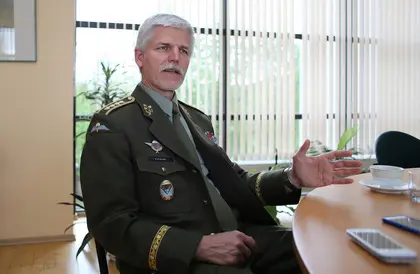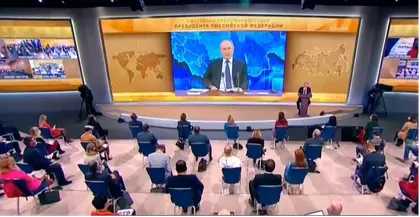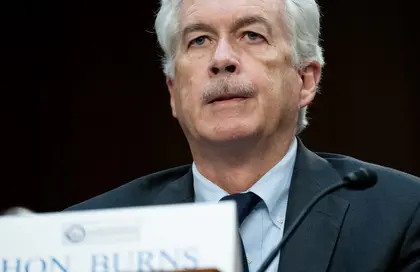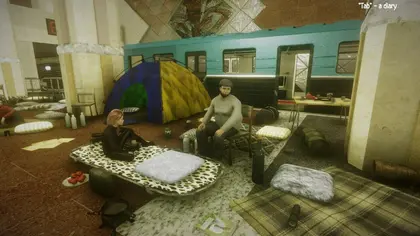“Sometimes I have a feeling that several politicians are underestimating Russia and probably overestimating their willingness to reconcile, to share,” said Pavel, a native of the Czech Republic who last year became chairman of the NATO Military Committee, the alliance’s highest military body. “Russian politics in modern history mostly was about dominating, ruling, controlling and not about peaceful co-existence.”
His views run counter to skeptics who have criticized the alliance as obsolete or who have called for a realignment of the security structure to include Russia or a shift in its priorities to fighting international terrorism rather than collective defense.
Moreover, most of the 28 NATO member countries don’t spend the recommended 2 percent of annual gross domestic product on their defense budgets, suggesting that their governments — and perhaps their people — don’t take Russia and other military threats seriously.
But Pavel, who recently wrapped up his second trip to Ukraine, said in an interview with the Kyiv Post that NATO has plenty of reasons to exist.
“Like anything produced by humans, it’s imperfect,” Pavel said. But the “founding idea” of collective defense is the right one, he said, so it’s better to improve NATO from within “than start something else.”
While it “sometimes takes longer” than anyone wants for 28 nations to reach consensus, such unanimous decisions represent a “great strength” of NATO, he said.
‘Much more difficult’ in Ukraine
President Petro Poroshenko has set 2020 for Ukraine to meet NATO standards, part of the nation’s dramatic security reorientation in the wake of the 2014 Russian invasion and occupation of Ukraine’s Crimean peninsula and the Kremlin’s ongoing war in the eastern Donbas. Recent polls show a majority of Ukrainians support NATO membership.
But Ukraine’s military was systematically degraded during the first 25 years of independence and the nation will have to upgrade to NATO standards while simultaneously fighting a war that Defense Minister Stepan Poltorak has warned could last for years.
“There are a lot of sentiments going both ways in Ukraine as well as in NATO countries: some of them might think Ukraine is doing fine, some might think Ukraine is not doing enough or fast enough,” Pavel said. “As usual, the truth is somewhere in between.”
People need to recognize that “Ukraine is in a much more difficult situation than any of our NATO allies,” Pavel said.
“All these complex difficulties create an environment where it’s difficult to run comprehensive reforms in the security sector. It’s simply too much. I believe that, given that environment, Ukraine is really delivering a tremendous amount of work,” he said. “The direction is set right and…we have developed a NATO framework addressing all the necessary issues for the Ukrainian armed forces to become strong and confident in dealing with the security of the country.”
Room for improvement
At the same time, NATO doesn’t set deadlines and leaves it up to Ukraine to meet improve standards, which remain deficient in many areas.
“If you look at any areas of activities of the armed forces, be it command and control, training, education, logistics support, personnel management. All these areas need improvement, but they need improvement in many NATO countries as well,” Pavel said. “We are always adapting to new situations. It will all depend on funding as well as political support.”
Pavel’s Czech Republic, formerly part of Czechoslovakia, is a case study of some of the dramatic transformations that Ukraine will have to undertake. His nation was part of the Soviet-dominated Warsaw Pact alliance, a rival to NATO during the Cold War.
Yet it was able to join NATO in 1999, as part of an enlargement with Poland and Hungary — also former Warsaw Pact members — that angers the Kremlin to this day.
Parallels with Czech Republic
Pavel said “there’s a lot of comparisons” between what the Czech Republic went through and what Ukraine is going through. During his 33-military career, he served as chief of the general staff of the armed forces in the Czech Republic from July 2012 to May 2015, which made him the highest-ranking officer in the Czech Army.
He described his native country as having only superficial knowledge of NATO requirements when it joined the Partnership for Peace program in 1994.
One of the hardest adjustments in the Czech Republic, and one one that faces Ukraine, is getting over the philosophy that “everything was directed from Moscow.”
NATO expects individual nations “to come up with our own solutions, which could then be compared to what we were advising. I have been saying to my counterparts in Ukraine: you have your own experience and you have your own background. Take advice as motivation not as instruction. You can teach us the same way we are teaching you.”
He said that, whatever happens on the military-strategic level, NATO and Ukraine need to put the needs of front-line soldiers first and he believes that Ukraine is doing so.
As for combatting international terrorism, Pavel said Ukraine does not need to change its roe of collective defense. But it has had to work more closely with law enforcement agencies.
“it’s about better sharing (of intelligence) and division of labor,” Pavel said. “We are achieving some results at this point.”
About Petr Pavel
Born: Nov. 1, 1961 in Plana u Marianskych Lazni, Czech Republic.
Appointed chairman of the NATO Military Committee: June 26, 2015.
Promoted to general: May 8, 2014.
Entered military: 1983 as special purpose airborne reconnaissance platoon leader.
Family: Wife Eva; two sons.
You can also highlight the text and press Ctrl + Enter







Comments (0)